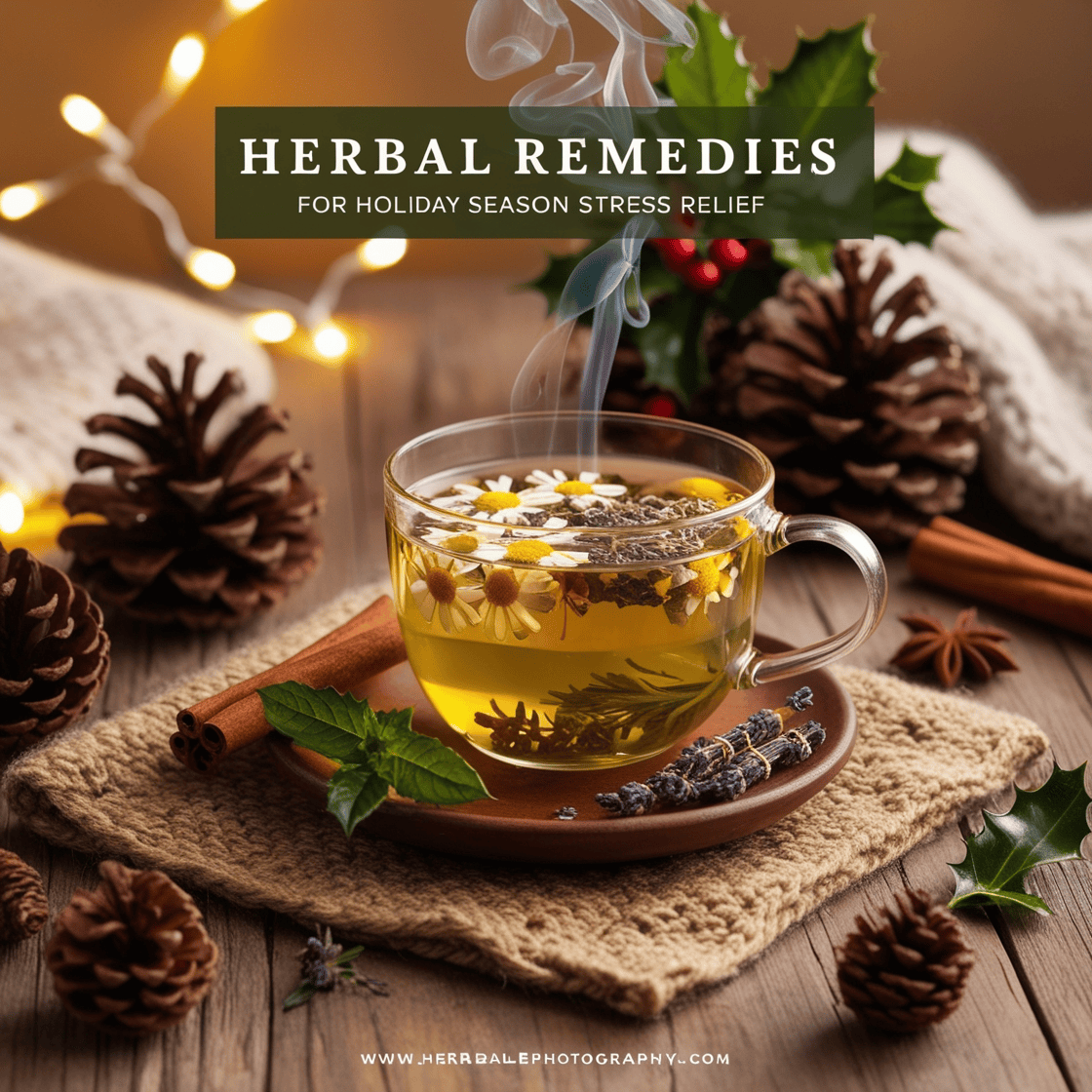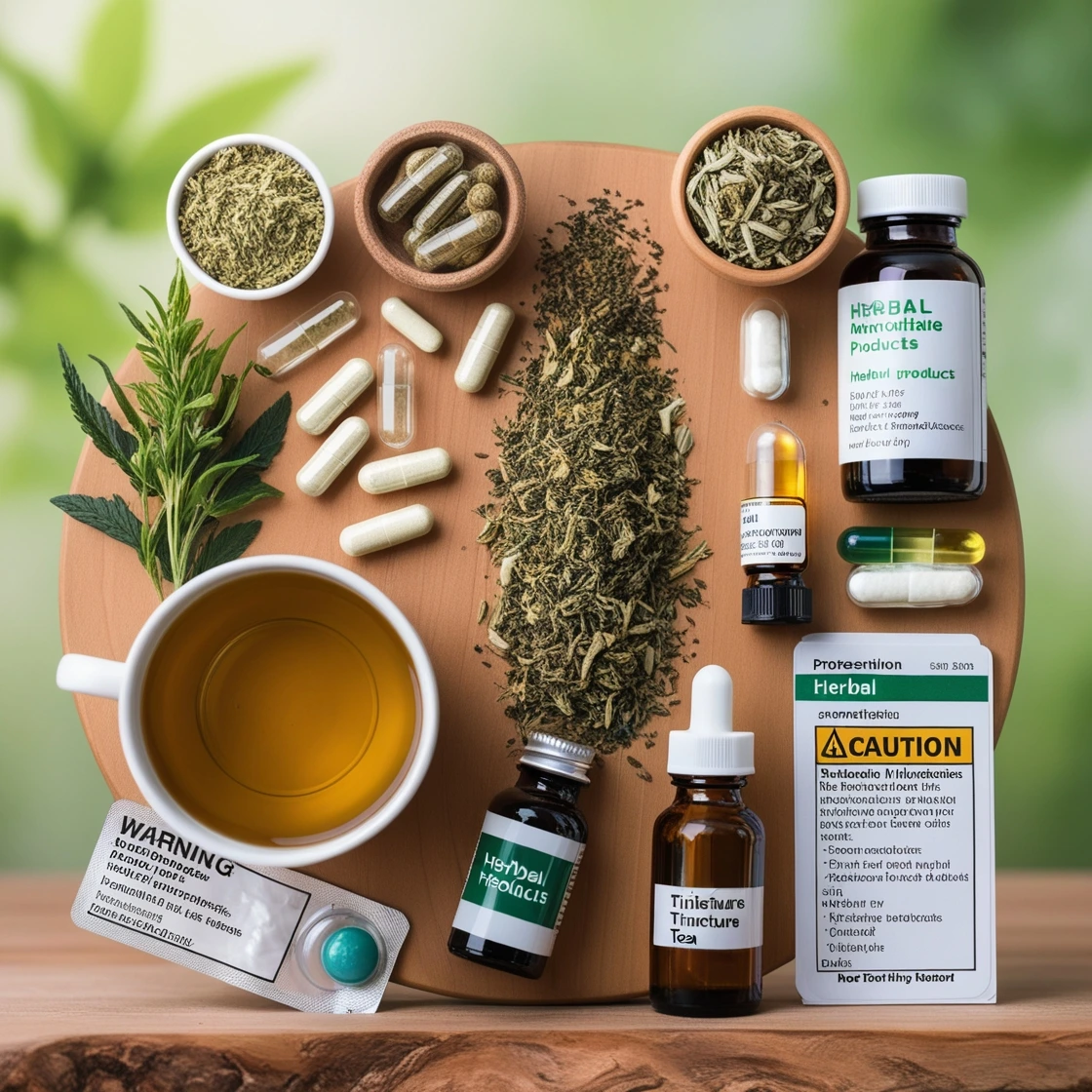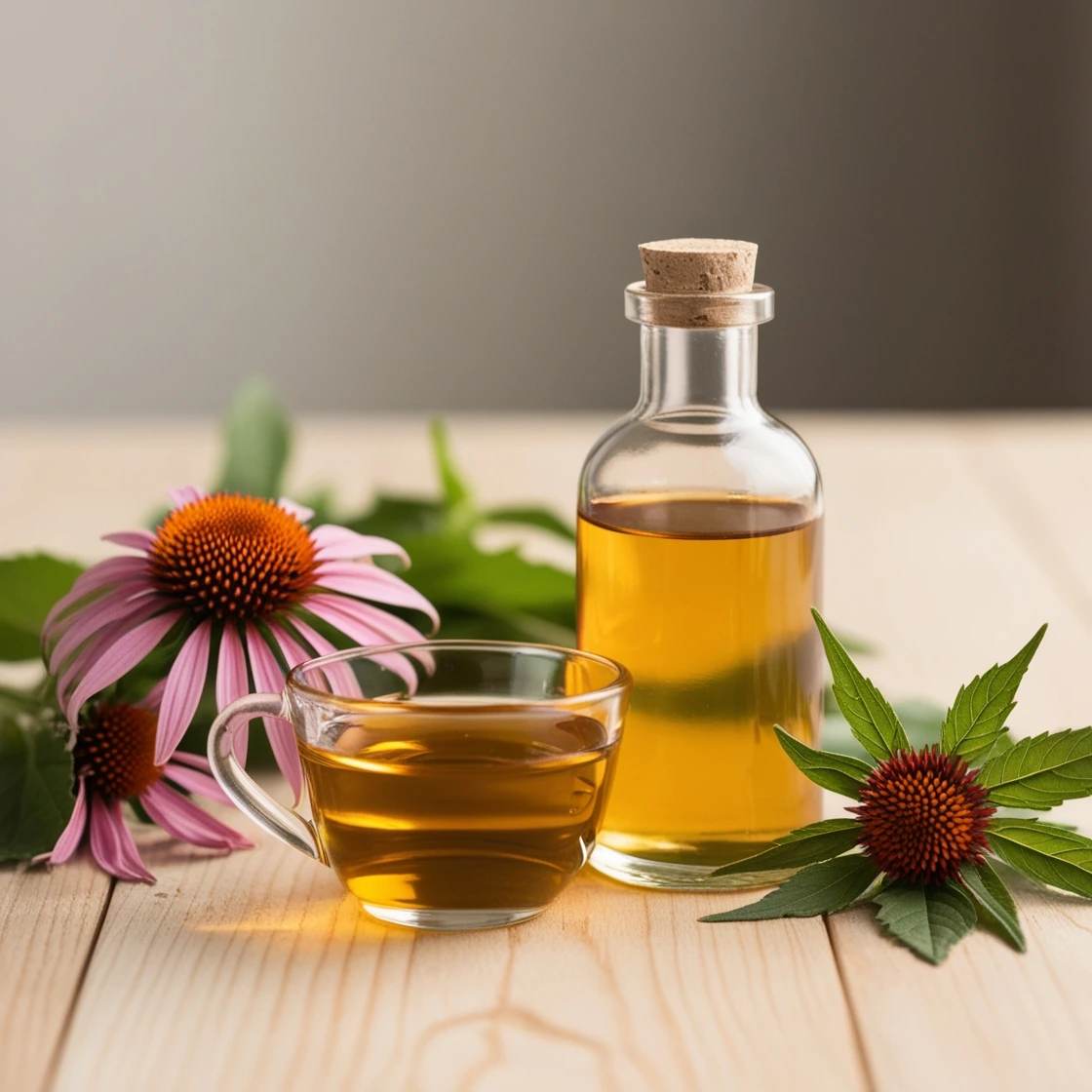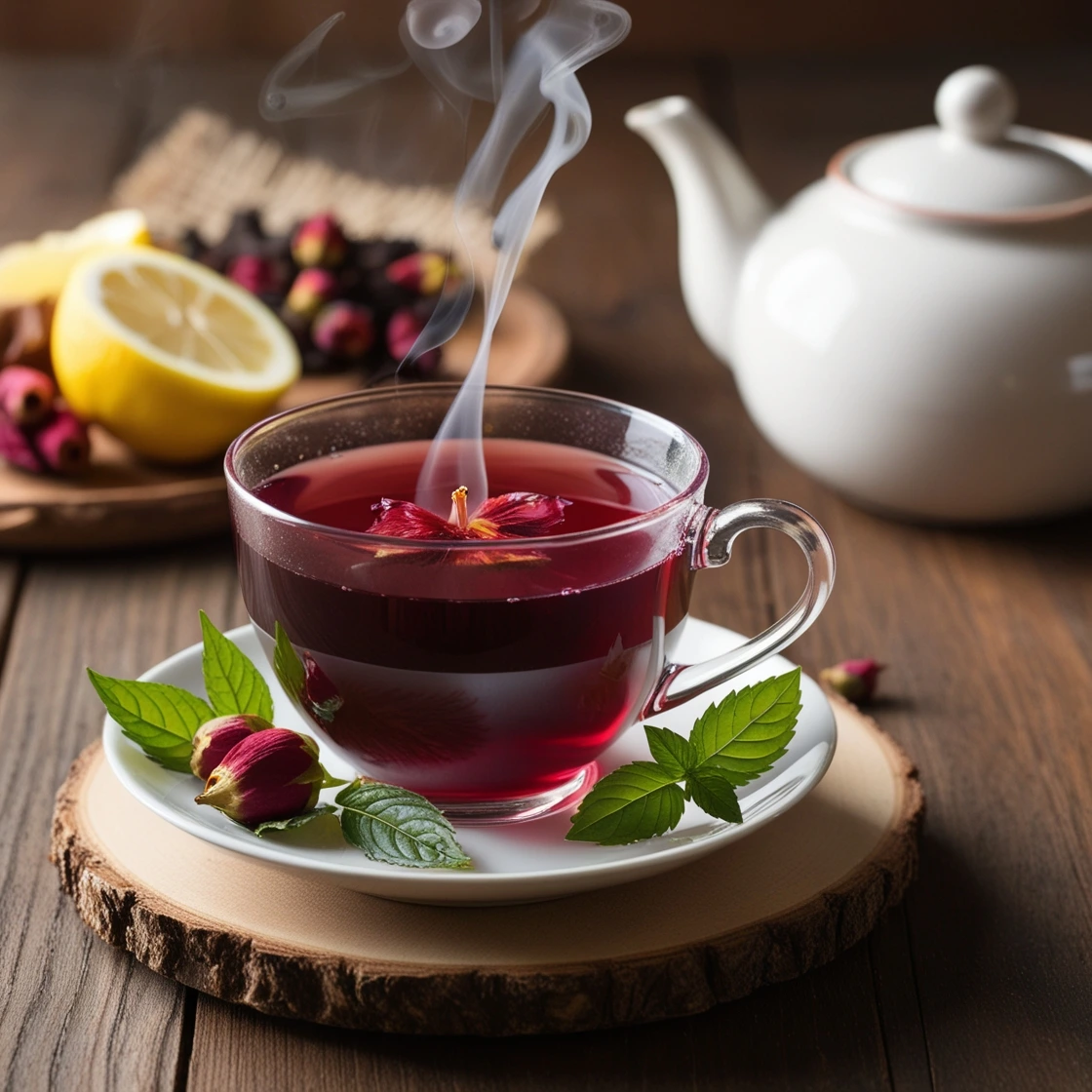Introduction
Holiday season is in full swing and Christmas is round the corner. While we don’t want to be the spoil sport in your Christmas celebrations, it’s a wonderful time to address seasonal health concerns with herbal remedies for the holiday season stress relief that act as a tonic for the immune system. But it is crucial to manage holiday stress and improve digestion by incorporating herbs of Christmas into your meals after festive feasts.
Confused about how to boost your immunity during holiday season and be healthy despite all the fun? Don’t worry here we will provide you with a complete guide to herbal remedies for the Holiday Season. You will get effective, plant-based solutions to support your well-being during the busy holiday season.
The holidays, while full of joy, often comes with challenges like stress, fatigue, seasonal health concerns, and the toll of rich meals on digestion. Ignoring these can dampen your celebrations and overall vitality.
If you are looking for natural and holistic wellness during the holidays, you have come to the right place. If you value health and want to incorporate herbal remedies into your routine, this is your perfect starting point.
We have all experienced the demands of the holiday season—endless to-do lists, late nights, indulgent meals, and rising stress levels. It’s easy for health to take a back seat amidst the festivities.
Herbal remedies, trusted for centuries, provide natural and effective solutions to these challenges. Unlike synthetic options, they work holistically, boosting your immune system, improving digestion, and helping manage holiday stress. With the increasing availability of plant-based wellness products and herbal supplements, it’s easier than ever to integrate these herbal remedies for the holiday season into your routine for a healthier year ahead.
Here we will explore the best herbal remedies for the holiday season. Consider incorporating herbs that promote sustainable living and wellness. From boosting your immune system to calming your frazzled nerves and improving sleep quality , herbs have many benefits. Cough can be alleviated with herbal remedies, including soothing herbal teas. You can find many over-the-counter herbal products that aid in digestion and overall health.
These herbal remedies for the holiday season will help you maintain balance and vitality, ensuring you fully enjoy this festive time of year. Last minute preparations can often lead to stress, so consider herbal solutions .Let’s find out how herbs can be your ultimate ally this holiday season!
Immune-Boosting Herbal Remedies for Winter
With winter comes colds, flu, and other respiratory illnesses, making immune support an essential focus during the holiday season. While vaccines and other preventive measures are important, adding herbal remedies to your routine can provide an extra layer of protection. Herbs like lemon balm and mint family members can also be added to your wellness routine. Echinacea and elderberry have been extensively studied for their immune-boosting properties and are excellent additions to your winter wellness toolkit. Peppermint and ginger are easy to grow and can aid in digestion. These can be excellent additions to your toolkit of herbal remedies for the holiday season.
1. Echinacea and Cranberry
Echinacea is an evergreen herb known for its ability to boost immunity. Native to North America, it has been traditionally used by indigenous peoples to treat infections and wounds. Research shows that its effective in reducing the duration and severity of cold symptoms by stimulating the production of white blood cells. For best results, take echinacea as a tea, tincture, or supplement at the first sign of illness. This herb is also effective in treating several other kinds of ailments such as an upset stomach, sore throat, wounds and burns.
Echinacea is mainly used to treat and prevent common cold and reduce its duration. However, there is little scientific evidence that this herb can treat common cold after you have caught it. Cranberry is one of the most well-known herbs for immune support, especially during the holiday season.
What Research Says
A study involving 4631 participants showed that taking Echinacea can reduce the risk of catching a cold by 10% -20%. However, there is lack of evidence that it can treat cold after you have caught it.
“Echinacea products have not here been shown to provide benefits for treating colds, although, it is possible there is a weak benefit from some Echinacea products: the results of individual prophylaxis trials consistently show positive (if non-significant) trends, although potential effects are of questionable clinical relevance,” the study says.
2. Elderberry
Elderberry is another powerful herb for winter wellness. Rich in antioxidants and vitamins, elderberry helps to boost the immune system and protect against oxidative stress. It is particularly effective in supporting respiratory health and preventing the spread of viruses. Elderberry syrup is a popular preparation that can be taken daily as a preventive measure or during illness to speed recovery.
What Research Says
A study involving 1187 records and included five randomized trials on elderberry for the treatment or prevention of viral respiratory illness shows that it is safe herbal remedy for viral respiratory illness.
“Elderberry may be a safe option for treating viral respiratory illness, and there is no evidence that it overstimulates the immune system. However, the evidence on both benefits and harms is uncertain and information from recent and ongoing studies is necessary to make firm conclusions,” says the study.
However, it is strongly recommended that you must not eat elderberries raw as it may lead to severe adverse side effects. “ Raw or unripe elderberries and other parts of the elder tree, such as the leaves and stem, contain poisonous cyanide-producing substances that can cause nausea, vomiting, and severe diarrhea; cooking eliminates this toxin. Large quantities of the toxin may cause serious illness,” states the National Centre for Complimentary and Integrative Health.
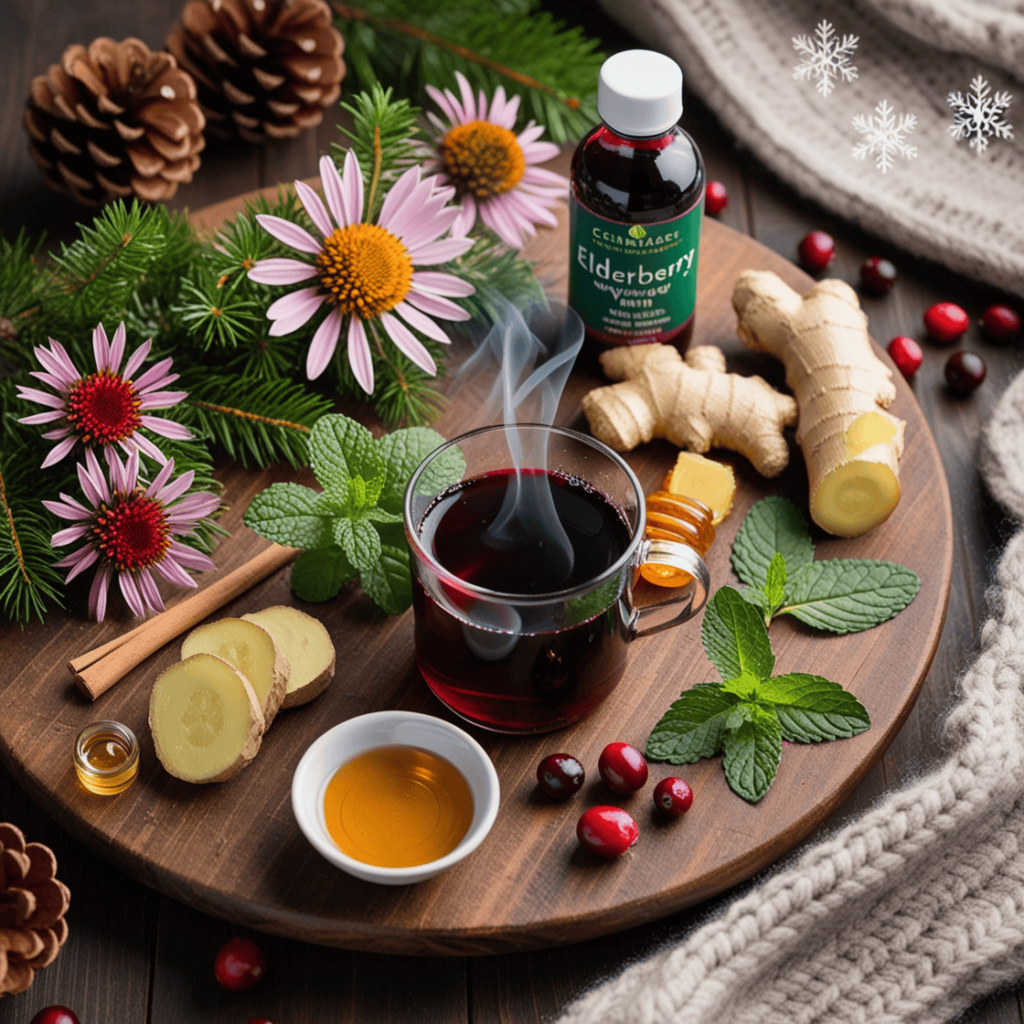
Other immune-boosting herbs
Other immune-boosting herbs to consider include those from the mint family. those from the mint family. ginger, turmeric, and licorice root. Cinnamon sticks and other herbs provide additional anti-inflammatory and antiviral benefits. Incorporate these herbs into your diet through teas, soups, or supplements to fortify your body against winter illnesses.
1. Ginger
- Contains Gingerol: Ginger is rich in gingerol, a bioactive compound with powerful anti-inflammatory and antioxidant effects.
- Effective for Nausea: Ginger effectively alleviates nausea and vomiting, including morning sickness during pregnancy and nausea induced by chemotherapy.
- Potential Benefit for Weight Loss: Some studies suggest that ginger may play a role in weight loss by enhancing calorie burning and reducing inflammation.
- Likely to Be Effective Against Osteoarthritis: Ginger’s anti-inflammatory properties may reduce symptoms of osteoarthritis, particularly in the knee.
- Lowers Blood Sugars and Reduce Heart Disease Risk Factors: Ginger has been shown to lower blood sugar levels and improve various heart disease risk factors in people with type 2 diabetes.
- Effective for chronic indigestion.: Ginger speeds up the emptying of the stomach, which can be beneficial for people with indigestion and related stomach discomfort. Herbal remedies like ginger can serve as a natural tonic for your digestive system.
- Relieves Menstrual Pain: Ginger appears to be very effective against menstrual pain when taken at the beginning of the menstrual period.
- Lowers Cholesterol Levels: There is some evidence that ginger can lead to significant reductions in LDL (bad) cholesterol and blood triglyceride levels, making it a lemony addition to your diet.
- Gingerol May Help Prevent Cancer: Gingerol, found in large amounts in raw ginger, has been studied as an alternative treatment for several forms of cancer.
- Protects Against Alzheimer’s Disease: Ginger can enhance brain function directly, protect against age-related damage to the brain, and may improve memory and reaction time.
- Boosts Immunity : Gingerol can help lower the risk of infections and inhibit the growth of many different types of bacteria, making ginger effective against oral bacteria linked to inflammatory diseases in the gums.
These benefits highlight the potential of incorporating ginger into your diet for its medicinal properties.
2. Turmeric
1. Contains Bioactive Compounds
Turmeric is rich in curcumin, a compound with powerful anti-inflammatory and antioxidant properties.
2. Natural Anti-Inflammatory Agent
Curcumin helps combat chronic inflammation, which is linked to various diseases like heart disease, cancer, and Alzheimer’s.
3. Boosts Antioxidant Capacity
Curcumin neutralizes harmful free radicals and stimulates the body’s own antioxidant defenses.
4. Improves Brain Function
Curcumin increases levels of BDNF (brain-derived neurotrophic factor), which supports brain health and may reduce the risk of neurodegenerative diseases.
5. Lowers Risk of Heart Disease
Curcumin improves the lining of blood vessels, enhances endothelial function, and reduces inflammation, contributing to better heart health.
6. May Prevent and Treat Cancer
Research suggests curcumin can influence cancer growth, development, and spread, potentially acting as a preventive or therapeutic aid.
7. Fights Age-Related Brain Diseases
Curcumin may delay or reverse conditions like Alzheimer’s by reducing inflammation and oxidative stress in the brain.
8. Relieves Arthritis Symptoms
The anti-inflammatory properties of curcumin can alleviate arthritis symptoms, making it comparable to certain anti-inflammatory drugs.
9. Supports Mental Health
Studies show curcumin may help improve mood and reduce symptoms of depression by boosting serotonin and dopamine levels.
10. Promotes Longevity Its anti-inflammatory, antioxidant, and cellular health benefits contribute to overall well-being and may enhance lifespan, particularly when combined with citrus-rich holiday recipes.
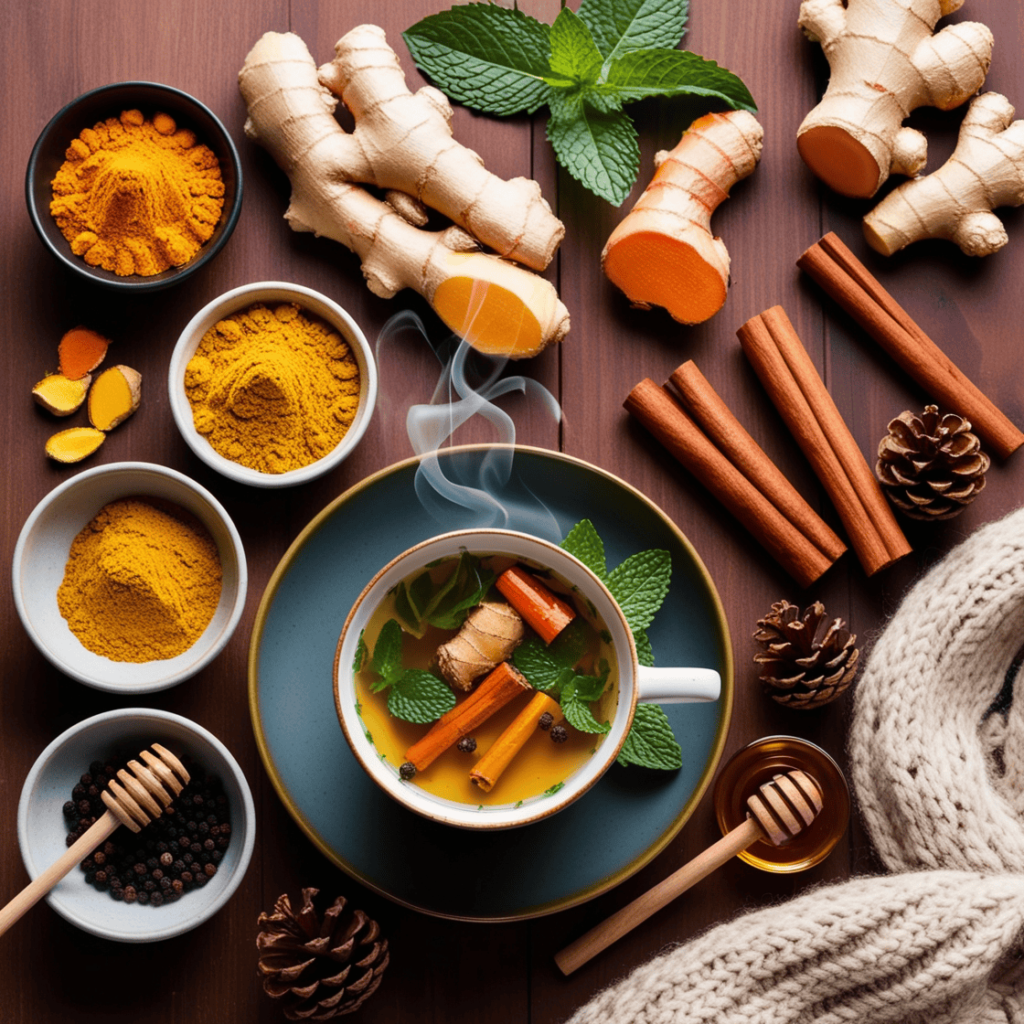
Herbs for Managing Holiday Stress
The holiday season, while joyous, can also be a major source of stress. From juggling social commitments to last-minute shopping, it’s easy to feel overwhelmed. Stress can impact your mental health and weaken your immune system, making it crucial to find effective ways to relax and recharge, such as using herbalism techniques.
Herbs like ashwagandha, chamomile, and Lemon balm, also known as melissa officinalis can help ease stress during the holidays. Herbal remedies are excellent choices for natural stress relief and can be a delightful indulgence.
1. Ashwagandha
Ashwagandha, an adaptogenic herb, is renowned for its ability to help the body adapt to stress. By balancing cortisol levels, ashwagandha not only reduces stress but also enhances energy levels and cognitive function. It is particularly helpful during the holidays when your to-do list seems never-ending. Take ashwagandha in powder or capsule form for optimal results.
According to the National Institutes of Health, a 2021 systematic review identified seven studies that investigated the use of ashwagandha to treat stress and anxiety, highlighting its potential benefits for sustainable living.
“ Overall, the studies found that ashwagandha significantly reduced stress and anxiety levels (subjectively measured by validated rating scales), reduced sleeplessness and fatigue, and reduced serum cortisol levels (a stress hormone) when compared with placebo. In several studies, the benefits appeared to be greater with doses of 500 to 600 mg/day than with lower doses,” it says.
2. Chamomile
Chamomile can also be added to your herbal repertoire for its calming properties, making it a great gift for those with frazzled nerves. is another go-to herb for stress relief. Known for its gentle sedative effects, chamomile tea is perfect for winding down after a hectic day.
Its calming properties make it an excellent choice for those struggling with holiday-induced insomnia or anxiety. Regular consumption of chamomile can also help improve digestion, another common concern during the festive season.
“Nowadays it is a highly favored and much used medicinal plant in folk and traditional medicine. Its multitherapeutic, cosmetic, and nutritional values have been established through years of traditional and scientific use and research,” says a study.
3. Lemon balm
For those who prefer a more uplifting herb, lemon balm offers mood-enhancing benefits. This aromatic herb helps to reduce anxiety, improve focus, and promote a sense of calm. Try adding lemon balm to your tea or using it as a tincture for quick relief; citrus flavors can also be added for an extra zest.
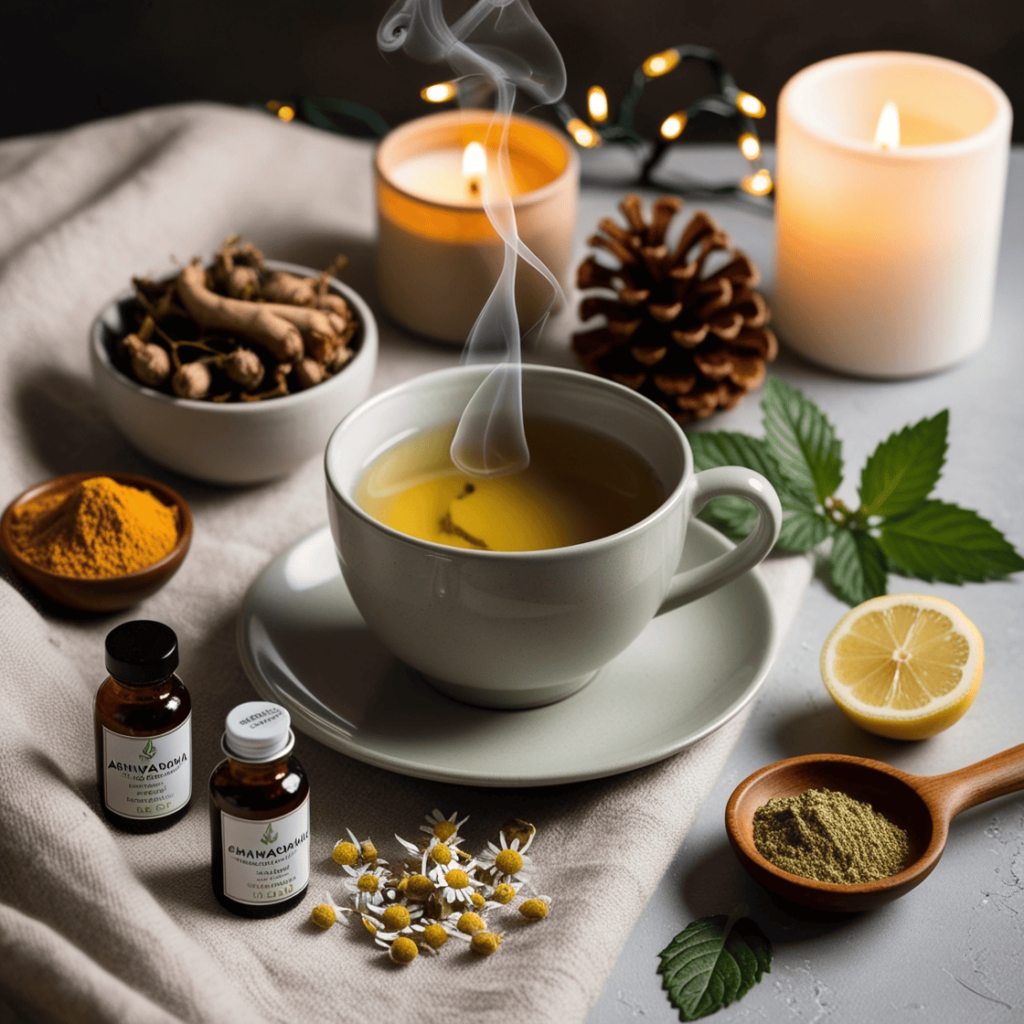
Festive Herbal Tea Blends for Relaxation
The holiday season often brings an increase in activity, from family gatherings to late-night festivities. While these moments are cherished, they can also disrupt your sense of calm.
One way to create a peaceful ritual amid the hustle and bustle is by enjoying a cup of chamomile tea with lemon juice and a hint of citrus. festive herbal tea blends. These teas not only provide comfort but also deliver numerous health benefits that help you manage stress, improve digestion, and support overall well-being.
1. Peppermint tea
A classic choice for relaxation is peppermint tea. Peppermint is known for its refreshing taste and ability to soothe the digestive system, making it ideal after a heavy holiday meal. It also has mild muscle-relaxing properties, which can help alleviate tension headaches caused by seasonal stress.
“In vitro, peppermint has significant antimicrobial and antiviral activities, strong antioxidant and antitumor actions, and some antiallergenic potential. Animal model studies demonstrate a relaxation effect on gastrointestinal (GI) tissue, analgesic and anesthetic effects in the central and peripheral nervous system, immunomodulating actions and chemopreventive potential. Human studies on the GI, respiratory tract and analgesic effects of peppermint oil and its constituents have been reported,” says a study.
2. Cinnamon and Clove tea
Cinnamon and clove tea are excellent options for adding a festive flair to your wellness routine. These warming spices are packed with antioxidants and have natural anti-inflammatory properties. They help improve circulation, reduce bloating, and promote relaxation. Adding a touch of honey or a slice of orange enhances the tea’s flavor and boosts its nutritional value.
3. Chamomile and Lavender tea
Chamomile and lavender tea blends are ideal for promoting deep relaxation. Chamomile helps ease anxiety and supports restful sleep, while lavender adds a soothing aroma that can calm your mind. Drinking a cup of this tea in the evening can serve as a self-care ritual to help you unwind from holiday stress.
4. Other Tea Blends
For those looking to experiment, try creating your own herbal tea blends using ingredients like ginger, cardamom, and fennel. These spices not only add a delightful holiday touch but also support digestion and immunity. Combine them with a base of green or black tea for added antioxidants and energy support.
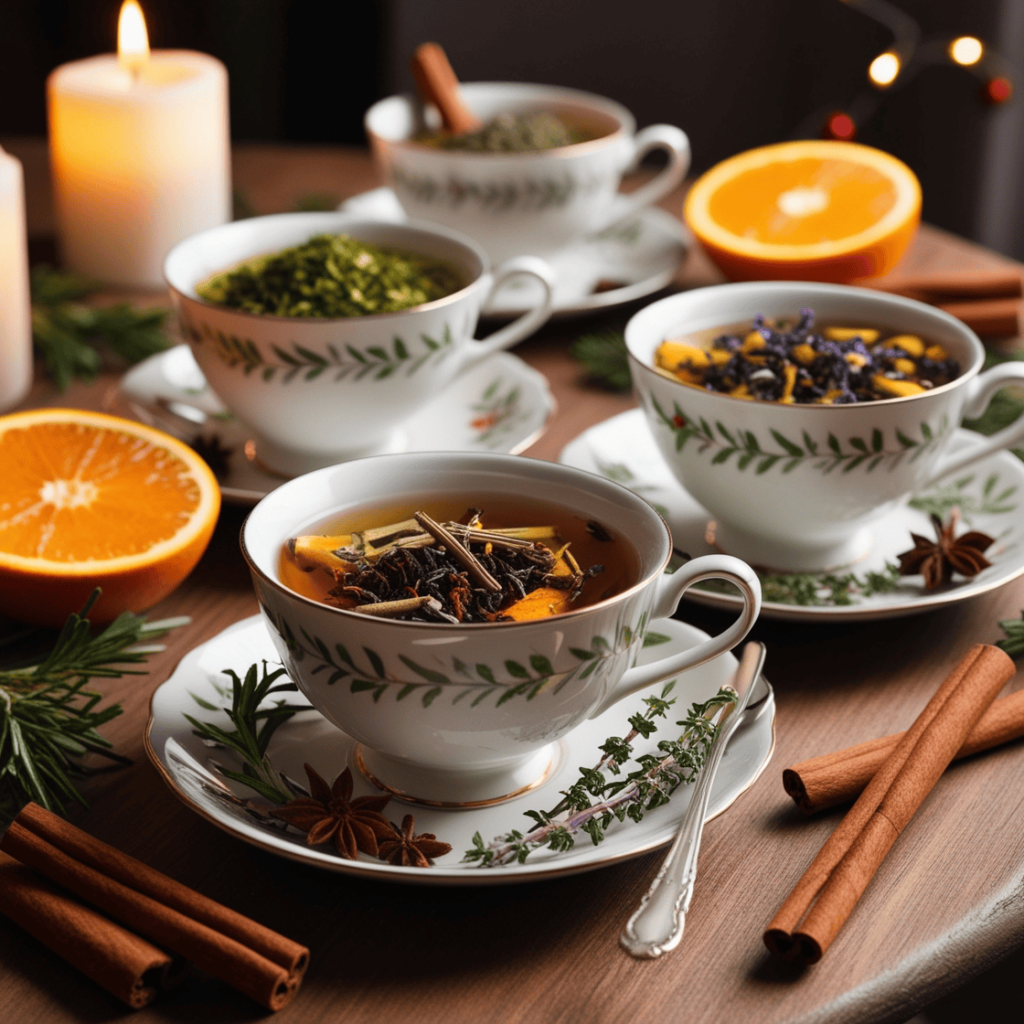
Herbal remedies for holiday digestion
Herbal remedies for holiday digestion can include ingredients like ginger, cinnamon sticks, and a splash of citrus for added flavor. Rich and indulgent holiday meals are one of the season’s highlights, but they can also lead to bloating, indigestion, and other digestive issues. Fortunately, herbal remedies can help your digestive system handle the extra load and keep you feeling light and comfortable.
1. Ginger
One of the most effective herbs for digestion is ginger. Known for its anti-inflammatory and carminative properties, ginger helps alleviate nausea, bloating, and cramps. It also stimulates the production of digestive enzymes, which enhances nutrient absorption.
Ginger tea, taken before or after meals, is a simple way to support your digestive health during the holidays and can be enhanced with a peel of lemon or a hint of citrus.
2.Fennel Seeds
Fennel seeds are often used in herbalism to support digestion and reduce bloating. They are another excellent remedy for holiday digestion. They help relax the gastrointestinal muscles, reducing bloating and gas.
Fennel also contains compounds that stimulate bile production, aiding in the breakdown of fats commonly found in holiday dishes. Chewing on fennel seeds or drinking fennel tea after meals can work wonders for your digestive system.
3. Peppermint
Peppermint, with its cooling and soothing properties, is perfect for relieving heartburn and indigestion. Its active compound, menthol, helps relax the muscles of the gastrointestinal tract, making it easier for food to pass through. A cup of peppermint tea is an excellent way to conclude a rich holiday meal.
4. Dandelion root and Chamomile
For those experiencing more severe discomfort, a combination of dandelion root and chamomile can provide relief. Dandelion root supports liver function, which is crucial for detoxifying after heavy meals, while chamomile soothes the digestive tract and reduces inflammation.
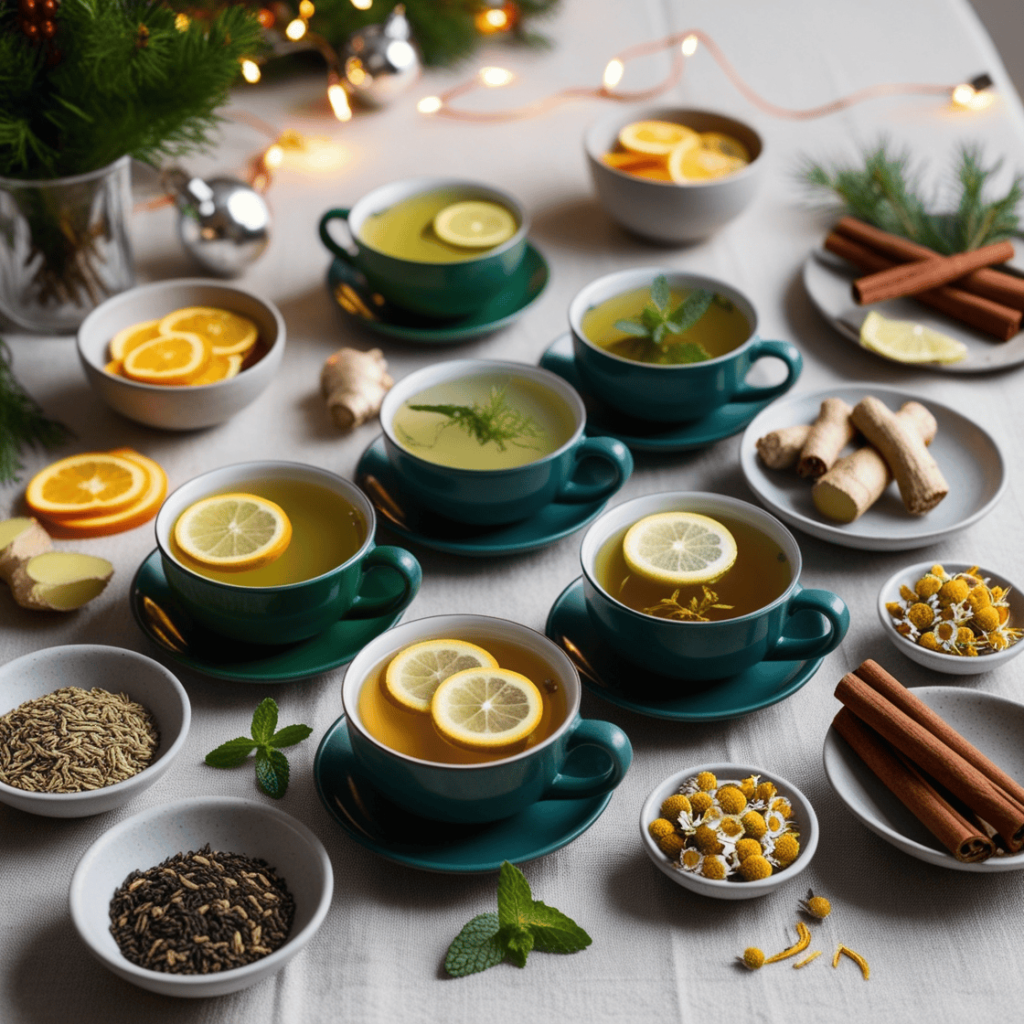
Herbal Remedies for Better Sleep
The excitement and demands of the holiday season can disrupt your sleep patterns, leaving you feeling fatigued and irritable. Proper rest is essential for maintaining your physical and mental health, and herbs can play a significant role in helping you achieve quality sleep. Herbal Remedies for Better Sleep can include ingredients like chamomile and basil. A handmade gift of herbal tea can be a thoughtful gesture for those dealing with seasonal health concerns.
1. Valerian root
Valerian root is one of the most effective natural sleep aids, especially when enjoyed on a cold winter’s night. Known for its sedative properties, valerian helps to relax the nervous system and improve the quality of sleep.
It is particularly useful for those who have difficulty falling asleep due to stress or anxiety. Taking valerian as a tea or supplement 30 minutes before bedtime can promote deep and restorative sleep.
“The qualitative dichotomous results suggest that valerian would be effective for a subjective improvement of insomnia, although its effectiveness has not been demonstrated with quantitative or objective measurements,” says a study.
2. Passionflower
Passionflower is an earthy herb known for its calming effects and is often used in herbal teas. It is another excellent herb for improving sleep quality. It works by increasing the levels of gamma-aminobutyric acid (GABA) in the brain, which helps to reduce stress and promote relaxation. Passionflower tea has a mild, pleasant taste and can be a soothing addition to your bedtime routine.
3. Chamomile
Chamomile, often referred to as the ultimate bedtime herb, is well-known for its calming effects. It not only helps you fall asleep but also improves the overall sleep cycle by reducing nighttime awakenings, especially when infused with mugwort and enjoyed as an indulgence.
Regular consumption of chamomile tea can enhance your sleep quality and help you wake up feeling refreshed, especially during winter’s nights.
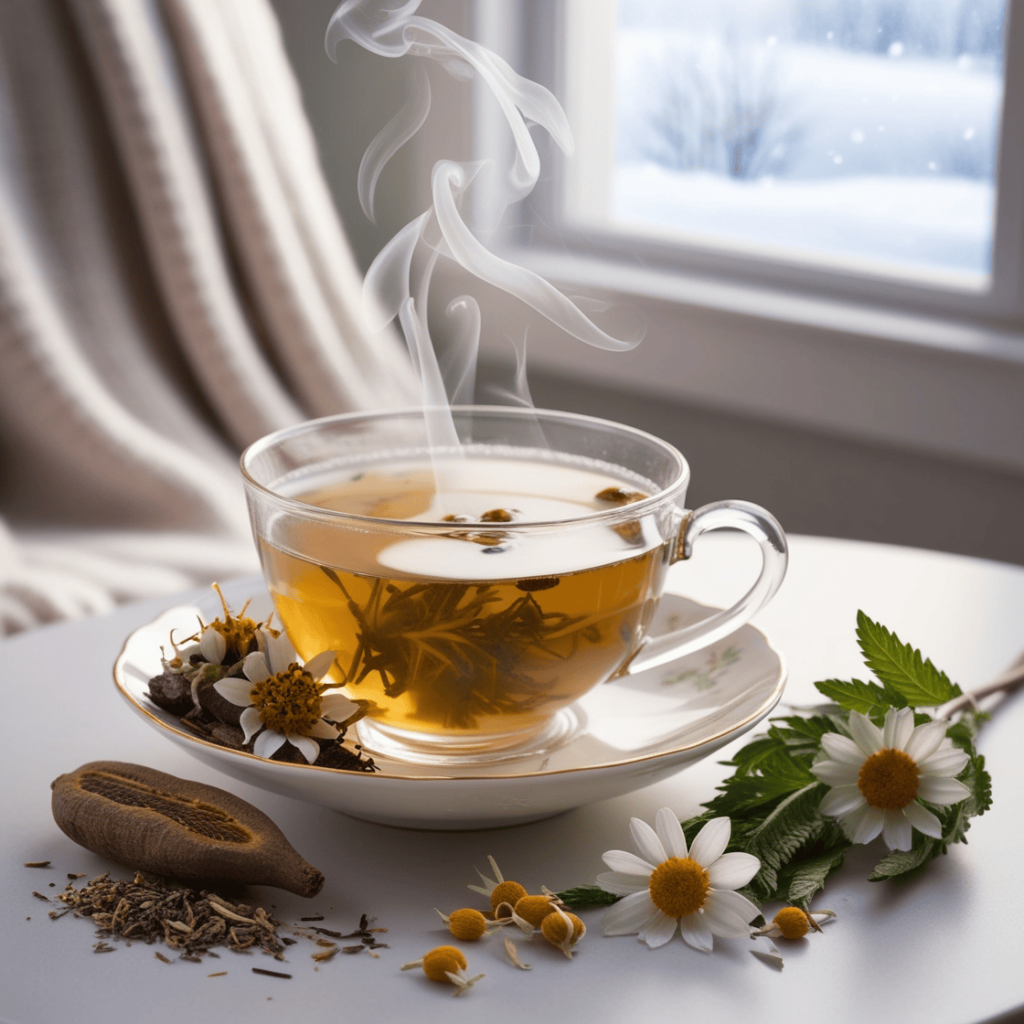
Lavender Essential Oil
For those looking to enhance their sleep environment, consider using lavender essential oil alongside herbal remedies. A few drops on your pillow or in a diffuser can create a calming atmosphere that encourages restful sleep. Combining these practices with herbal teas ensures you get the restorative rest needed to enjoy the holiday season to its fullest.
Conclusion
The holiday season is a time of joy, celebration, and togetherness, but it can also bring stress, fatigue, and health challenges. By incorporating herbal remedies into your daily routine, you can maintain your well-being and fully enjoy the festivities. Immune-boosting herbs like echinacea and elderberry can be the perfect addition to your wellness routine. Stress-relieving blends can be enhanced with culinary herbs like basil and thyme for added flavor and benefits.
Herbal teas, in particular, offer a versatile and enjoyable way to harness the power of nature. Whether you’re seeking relaxation, better digestion, or improved sleep, a cup of peppermint, ginger, or chamomile tea can provide comfort and support.
Meanwhile, warming spices like cinnamon and clove not only add festive flavors and decorate your meals but also bring essential health benefits, ensuring you stay balanced during the season.
Beyond individual health benefits, these remedies encourage mindful self-care. Preparing and consuming herbal teas or remedies can become a calming ritual amidst the chaos. They allow you to pause, reconnect with yourself, and prioritize your health in meaningful ways.
Additionally, incorporating these natural solutions is a step toward sustainable wellness. By opting for organic and responsibly sourced herbs, you not only benefit your body but also contribute to environmentally conscious practices. Herbal remedies are a testament to how traditional wisdom and modern understanding can combine to create effective, holistic health solutions.
This holiday season, let nature guide you toward better health and harmony. Whether it’s through a soothing tea blend, a digestive herb post-feast, or a bedtime routine enhanced with lavender, herbal remedies provide an accessible and time-tested way to enhance your holiday experience. Embrace these natural solutions and make your celebrations not only joyful but also healthful and stress-free. So which herbal remedies for the holiday season you prefer most? Tell us in the comments section.
Key Takeaways: Herbal Remedies for the Holiday Season
- Boost Immunity Naturally: Herbs like echinacea, elderberry, and ginger are excellent for fortifying your immune system during the winter months, helping you ward off seasonal colds and flu.
- Manage Holiday Stress with the help of herbal tea bags.: Natural stress-relief herbs like chamomile, lavender, and passionflower can ease anxiety and promote relaxation, helping you stay calm and present during festive gatherings.
- Improve Digestion Post-Feast: Digestive-supporting herbs such as peppermint, fennel, and ginger can alleviate bloating, heartburn, and indigestion after rich holiday meals.
- Promote Restful Sleep: Valerian root, chamomile, and passionflower tea are effective natural remedies for better sleep, ensuring you wake up refreshed and ready to embrace the day.
- Warm Up with Festive Teas: Seasonal blends with cinnamon, clove, and cardamom offer both comforting flavors and health benefits, like improving circulation and digestion.
- Practical and Accessible: Herbal teas, tinctures, and essential oils are easy-to-use remedies that can be integrated into daily routines, making self-care effortless during the busy holiday season.
- Eco-Friendly Wellness: Opt for organic and sustainably sourced herbal products to care for both your health and the planet.
FAQ: Herbal Remedies for Holiday Season
1. Can herbal remedies, like a digestive aid, prevent seasonal illnesses like colds and flu?
Herbs like echinacea and elderberry have immune-boosting properties that can help reduce the severity and duration of seasonal illnesses. However, they are most effective when combined with a healthy lifestyle.
2. Are herbal teas effective for managing stress?
Yes, herbal teas like chamomile, passionflower, and lavender are known for their calming effects, especially when you’ve made them with a touch of citrus. They can help alleviate anxiety and improve relaxation during high-stress periods like the holidays.
3. What herbs are best for digestive health after holiday meals?
Ginger, fennel, and peppermint are excellent choices for relieving bloating, heartburn, and indigestion. They stimulate digestion and relax the gastrointestinal system.
4. Are there any side effects of using herbal remedies, particularly those that serve as a digestive aid?
While most herbs are safe when used as directed, some may interact with medications or cause allergic reactions. Consult a healthcare professional before starting any herbal regimen for the night’s best results.
5. Can herbal remedies replace traditional medicines?
No. Herbal remedies complement traditional medicine but are not substitutes; they can make a big difference in managing holiday stress. They work best as part of a holistic wellness approach.
6. Where can I find high-quality herbs for these remedies?
Look for organic and sustainably sourced herbs at reputable health stores or online retailers. Always check for certifications to ensure quality.

